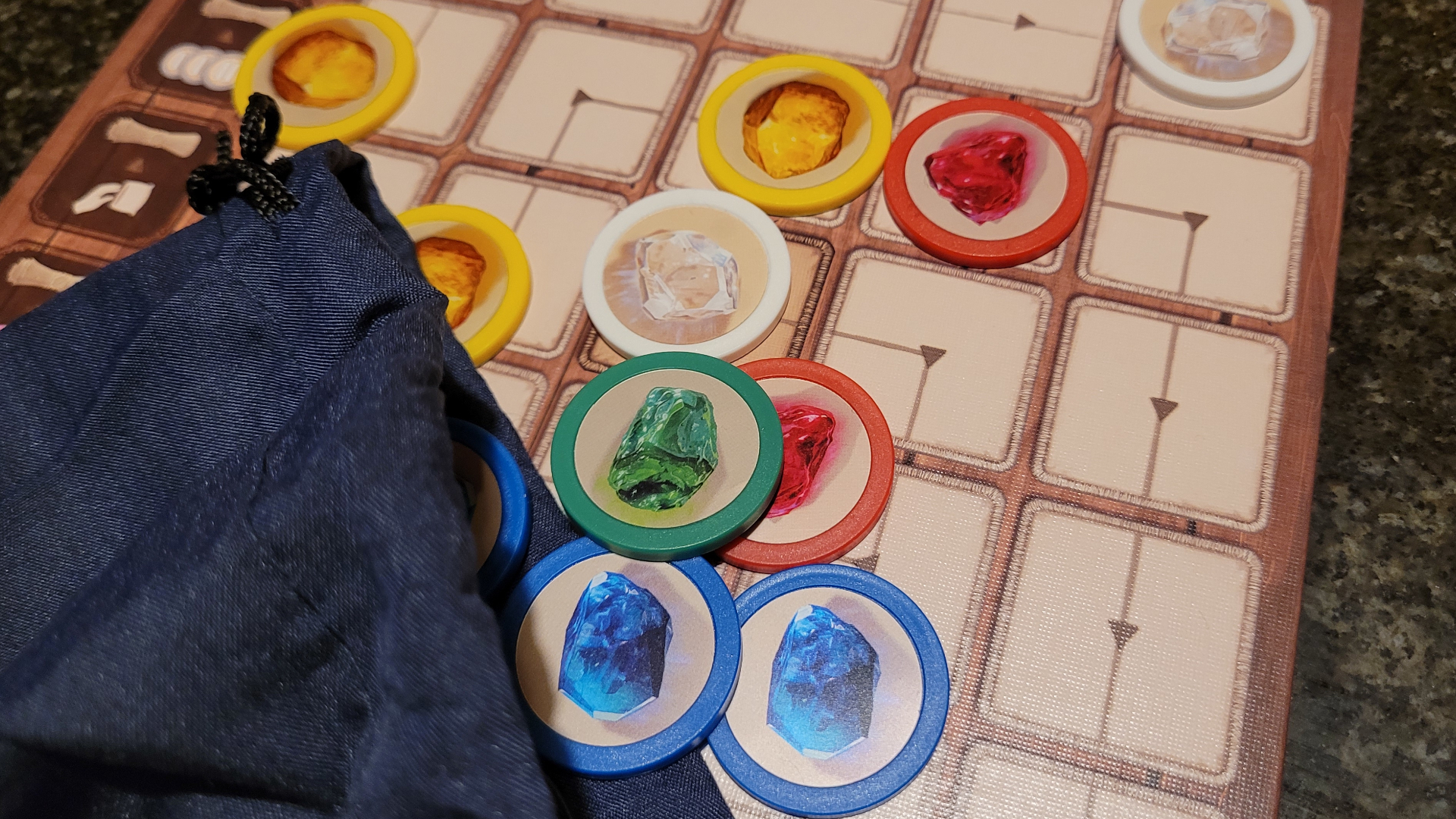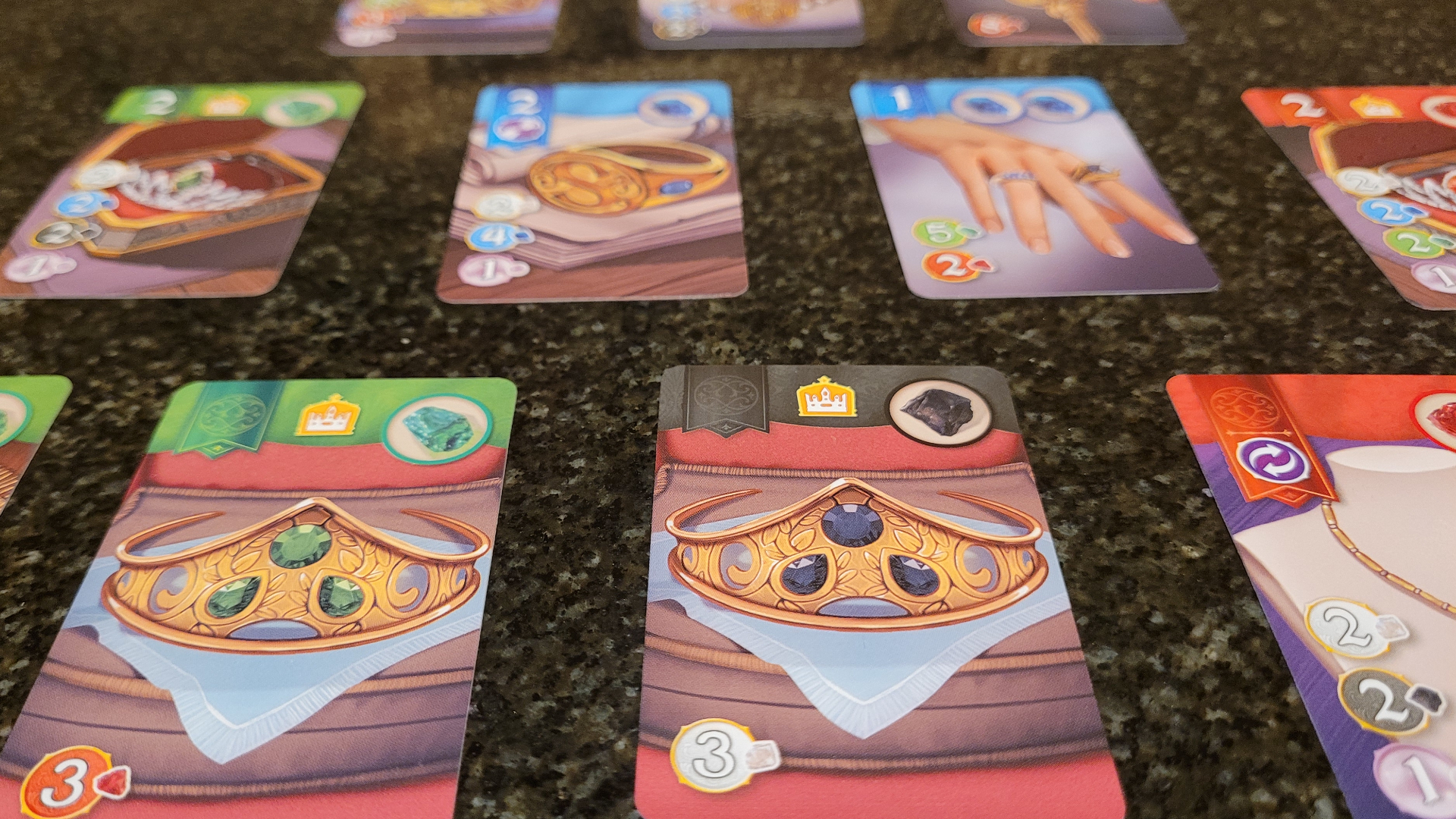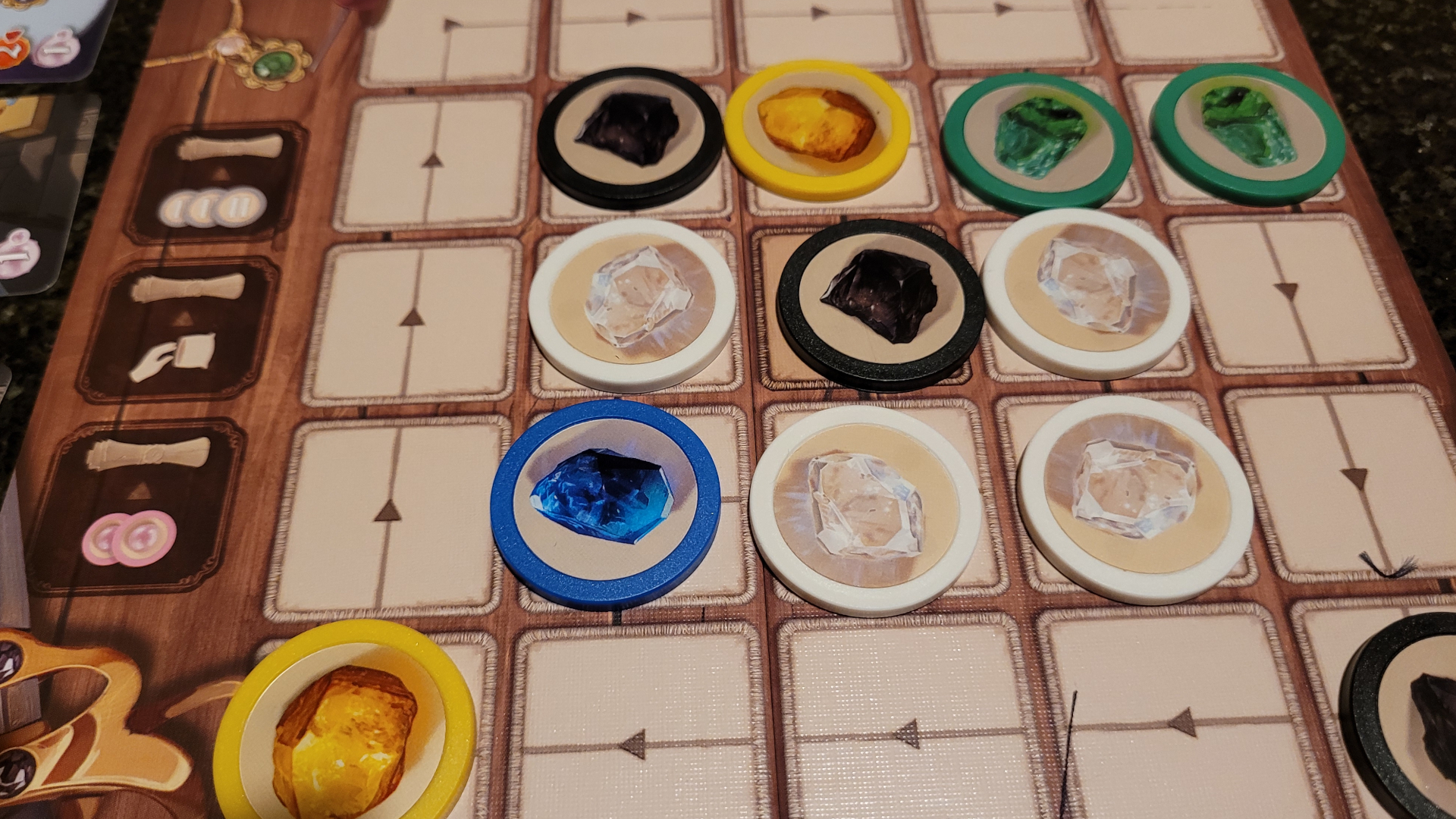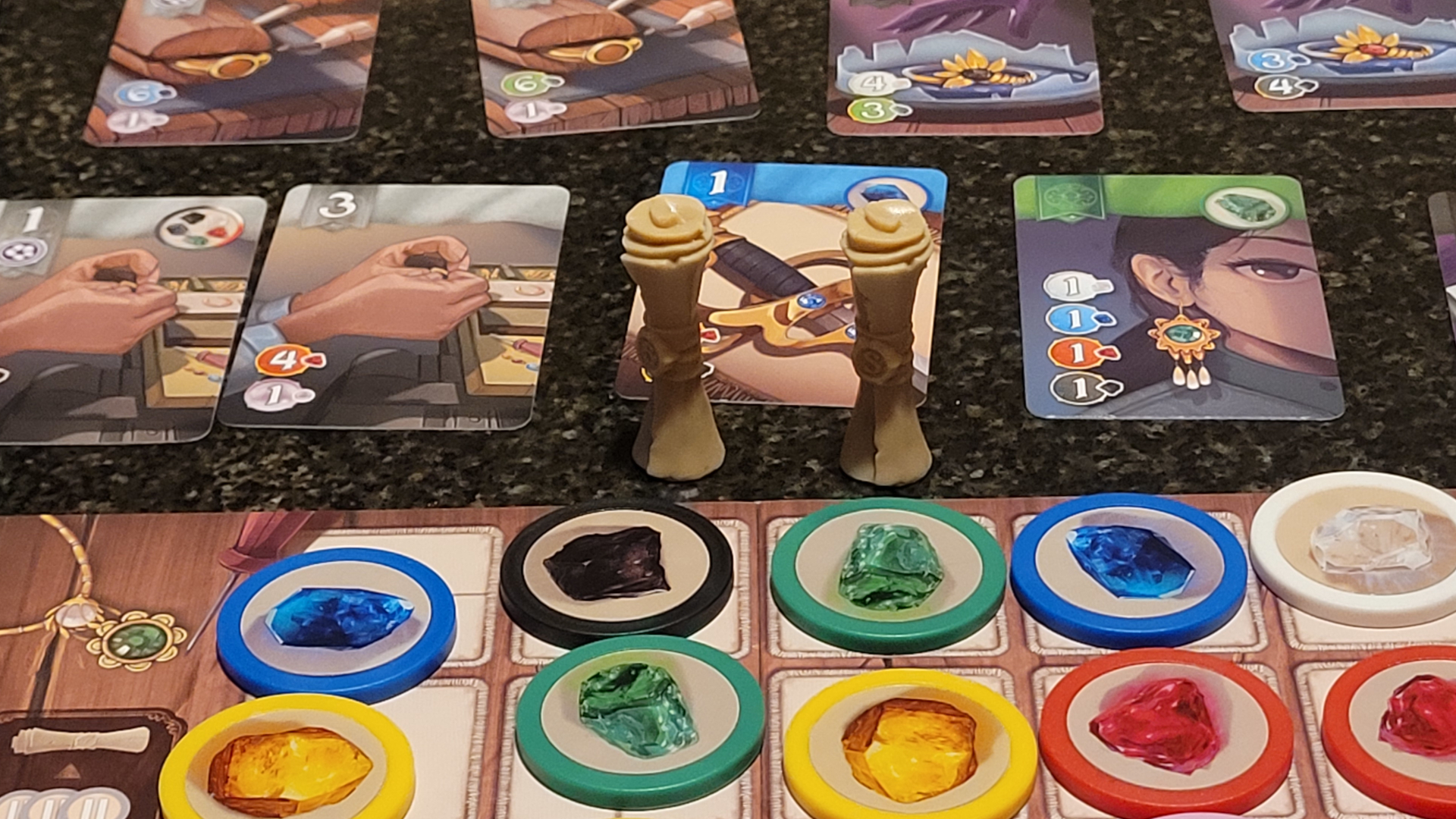GamesRadar+ Verdict
Splendor Duel manages to feel both old and new at the same time; it's at once familiar and refreshing. However, give this two-player reworking your time and you'll find that it may be better than the original.
Pros
- +
Brings a new sense of dynamism and depth to a well-worn classic
- +
Great combination of engine building with spatial strategy
- +
Looks good on the table with chunky poker chips and colourful art
Cons
- -
New victory conditions can be unreliable
- -
Veterans of the original may find this too familiar in mechanical terms
Why you can trust GamesRadar+
Splendor Duel has some big shoes to fill. Splendor was one of 2014’s best titles and has wormed its way into the collective gaming consciousness in the years since then as a minor classic. Ostensibly about gem crafting, it was really an abstract exercise in which players built very simple economic engines. The same basic concept underpins Duel, except it’s for two players only.
This is something of a surprise; the original worked fine with two people behind the table anyway, though it was admittedly a bit light. So what does Splendor Duel offer that the original (which is good enough to match some of the best board games) doesn't? As it happens, this reworking has a number of new facets it brings to the table... and it might just trump the original.
What is it, and how does it work?

Both Splendor Duel and its predecessor share the same basic structure. On your turn, you can do one of three things. First, you're able to take some gem tokens from a selection of different colours. Second, you can exchange some of the tokens you’ve got for gem cards from a face-up selection, which then count as permanent tokens from that point on. Or, third, you can reserve one of the gem cards to buy on a future turn and also take a gold token which can be spent as any gem colour.
No matter what you decide, it’s a straightforward efficiency exercise in that you’ve got to make better, tighter purchases than your opponent in the race to claim the most expensive gems (which are also worth victory points). It also repeats its parent game's sense of style, with bright cards and chunky, satisfying poker chip gem tokens that click and clank together in their draw bag. But Splendor Duel throws a number of interesting wrinkles into this formula.
Not only does this play a lot more distinctively than its minor rules changes would suggest, it’s actually a superior game
To start with, there’s a new gem colour and you don’t get a free choice of tokens. They start out on a board, drawn blind from a bag, and you can take up to three of them in an uninterrupted line. At the start of your turn you can, if desired, redraw all the spent tokens from the bag back onto the board. This gives you more choice, obviously, but it also gives your opponent a 'privilege' token that they can trade in to take a single gem token from the board.
Next, many of the cards have a special ability when you buy them such as an immediate second turn, a free privilege token, or even taking a gem token from your opponent.
Finally, the winning conditions have changed. The original race for points still counts and you’ll need twenty to claim victory that way. But you can now also win with ten of a secondary resource, crowns, or by getting ten points in a single gem colour.
Is it any good?

Anyone who’s played the original will spend their opening turns of Splendor Duel wondering why on earth the designer felt the need to revisit something that already worked fine in terms of board games for 2 players. By the end of that first game, however, it will be clear that not only does this play a lot more distinctively than its minor rules changes would suggest, but that it’s actually a superior game in almost every regard.
Take the board, for starters. Previously your choice of gems was based entirely on what was available and what worked well with your growing collection of cards, all while trying to deny the more scarce resources to your opponents. And that’s still true here. But now you’ve also got the spatial aspect to consider. Clever picks can strand particular colours your foe is collecting in ones or twos, meaning they’re making less efficient picks if they take them. And there’s a constant dance to not be the one who has to refill the board. In a fight as tight as this, giving up a single privilege token (which can later be used to create an infuriating gap in a three-sequence you want to take) can feel like giving blood.
It is at once both old and new
That sense of constant one-upmanship pervades the whole enterprise. You don’t want to give anything away. You almost don’t want to spend gems because they’ll eventually end up back in circulation for your opponent to collect.
Timing is a huge part of the deal as you ponder when to reserve cards before your opponent does, or when to risk a refill. The special card abilities play a big role here as well. Getting to take an extra turn can be an important swing if timed correctly, and the one that lets you steal directly from the other player is particularly vicious, verging on a table-flip trigger if activated at a pivotal moment.
In addition, one of the special powers helps enrich more strategic aspects of play: the ability to mimic another card’s gem colour bonus. This is important because of the new victory condition which allows you to win with just ten points in a single colour. That limits what you can buy, of course, but the ability to double up bonuses with that ability makes it a realistic goal. It’s a similar story for winning via crowns, as you can win a choice of bonuses on getting three or six crowns on your way to the ten required for victory.

While the diversity of victory conditions feels like yet another welcome improvement on the original, enriching strategy and excitement as you sprint to get over the line, repeat plays suggest the new options fall a bit short. With both crowns and a single colour, you’re very much at the mercy of the card market; if what you’re collecting doesn't turn up, there’s nothing you can do about it.
Splendor Duel also has a weird dichotomy going on as regards its relationship with its parent game. On the one hand, it feels very different to play. It’s more exciting, more strategic, and gives you much more of a sense of direct competition. On the flip side, because the core gameplay loop is the same, seasoned players may find this over-familiar despite all the new things to get to grips with. It is at once both old and new.
Should you buy Splendor Duel?
With its combination of accessible play and rewarding strategy, it’s hard not to recommend Splendor Duel. The caveats are the ones that commonly come with small box two-player games of this type; obviously, it’s just for two and it lacks the sense of epic scale or wow-factor you get from bigger games. But if you’ve got space in your life for smaller board games for adults, this punches well above its weight class and should give you plenty of head-to-head pleasure.
How we tested Splendor Duel
I played Splendor Duel multiple times to get a sense for its mechanics and their longevity, including how it compared to the original Splendor - particularly with regard to that game's two-player matches.
This copy of Splendor Duel was provided by Asmodee.
For more recommendations, check out these essential cooperative board games. We also have guides to the top board games for families and must-have classic board games.
Matt is a freelance writer specialising in board games and tabletop. With over a decade of reviews under his belt, he has racked up credits including IGN, Dicebreaker, T3, and The Guardian.




